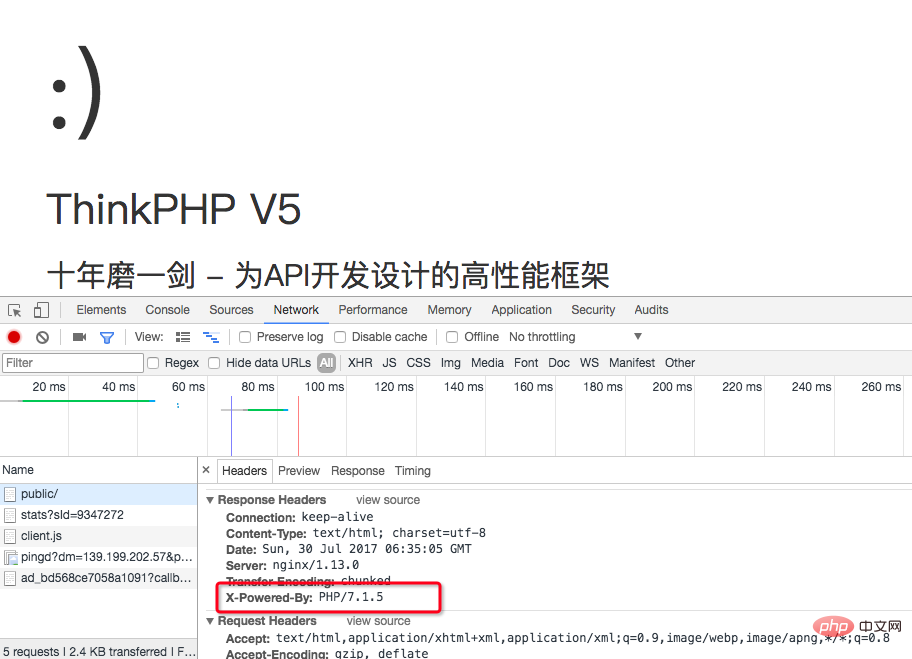Introducing the comparison between php7 and php5

Recommendation (free): PHP7
When PHP7 came out, it was said to be much faster than the old version. Times, the speed and efficiency of various open source frameworks or systems running on PHP7 have increased several times. Anyway, both the media and developers are fanning the flames, no, they should be full of praise.
I will just watch you show off quietly and say nothing.
Generally, I am the last person to upgrade mobile phone systems because I don’t want to step into the trap. After all, systems like iOS and Android will have bugs, not to mention the most hacked languages in the world.
The time has come today to see if PHP7 is as awesome as the legend says.
Install two PHP versions
http://php.net/ There is already the latest version of PHP7, you can download it yourself.
In order to test the performance of PHP5 and PHP7 (PHP6 has been abandoned, distressed 1s), I installed two php versions in different directories.
The installation process is skipped. Regardless of source code installation or package management tool installation, just remember your own path.
PHP7:
# /usr/local/php7/bin/php -vPHP 7.1.5 (cli) (built: May 13 2017 23:36:41) ( NTS )Copyright (c) 1997-2017 The PHP GroupZend Engine v3.1.0, Copyright (c) 1998-2017 Zend Technologies
PHP5:
# /usr/bin/php -vPHP 5.6.30 (cli) (built: Jan 19 2017 22:31:39)Copyright (c) 1997-2016 The PHP GroupZend Engine v2.6.0, Copyright (c) 1998-2016 Zend Technologies
Environment description: In order to ensure the best test effect, this test is conducted directly in the production environment, which is closer to the real situation.
Operating system: CentOS 7.2 64-bit
Basic configuration: 1 core 1GB 1Mbps
Host brand: Tencent Cloud
Competition between PHP7 and PHP5
1. Pure php script test
##vim test.php
$arr = array();for ($i = 0; $i < 500000; $i++) {$arr[$i] = $i;}$tmp = array();foreach ($arr as $i) {if ($i % 2 == 0) {$is_exists = array_key_exists($i, $arr);if ($is_exists) {array_push($tmp, $i);}}}time /usr/bin/php test.php real 0m0.301suser 0m0.239ssys 0m0.050s--------------------------time /usr/bin/php test.phpreal 0m0.310suser 0m0.241ssys 0m0.054s--------------------------time /usr/bin/php test.phpreal 0m0.289suser 0m0.238ssys 0m0.050s
time /usr/local/php7/bin/php test.phpreal 0m0.087suser 0m0.063ssys 0m0.024s-------------------------------------time /usr/local/php7/bin/php test.phpreal 0m0.106suser 0m0.073ssys 0m0.033s--------------------------------------time /usr/local/php7/bin/php test.phpreal 0m0.083suser 0m0.061ssys 0m0.022s
2.php database operation test
First we create a user table:Table: test_userCreate Table: CREATE TABLE `test_user` (`uid` int(11) NOT NULL AUTO_INCREMENT,`name` char(100) NOT NULL DEFAULT '',PRIMARY KEY (`uid`)) ENGINE=InnoDB AUTO_INCREMENT=1 DEFAULT CHARSET=utf8
insert into test_user (uid,name) values (1,"dada");MariaDB [test]> select * from test_user;+-----+------+| uid | name |+-----+------+| 1 | dada |+-----+------+
/usr/bin/php -m|grep pdopdo_mysqlpdo_sqlite/usr/local/php7/bin/php -m|grep pdopdo_mysqlpdo_sqlite
$host = "yourHost";$user = "yourUser";$pass = "yourPass";$db = "test";$port = 3306;try{$dbh = new PDO("mysql:host=$host;dbname=$db", $user, $pass);echo "Connected<p>";}catch (Exception $e){echo "Unable to connect: " . $e->getMessage() ."<p>";}$sql = "select SQL_NO_CACHE * from test_user;";$tmp = array();for ($i=1; $i<=500000; $i++) {$ret = $dbh->query($sql);foreach ($ret as $row) {$tmp['id'] = $row['id'];$tmp['name'] = $row['name'];}}time /usr/bin/php test_db.phpreal 0m48.396suser 0m11.149ssys 0m3.998sreal 0m51.447suser 0m11.800ssys 0m4.395sreal 0m51.517suser 0m11.733ssys 0m4.439s
real 0m47.900suser 0m9.875ssys 0m4.130sreal 0m46.977suser 0m9.760ssys 0m3.983sreal 0m50.010suser 0m10.268ssys 0m4.307s
3.PHP framework test
thinkphp
- (1) Framework entry test
time /usr/bin/php ./public/index.phpreal 0m0.036suser 0m0.026ssys 0m0.010sreal 0m0.038suser 0m0.026ssys 0m0.012sreal 0m0.041suser 0m0.032ssys 0m0.009s
time /usr/local/php7/bin/php ./public/index.phpreal 0m0.027suser 0m0.021ssys 0m0.005sreal 0m0.027suser 0m0.018ssys 0m0.009sreal 0m0.025suser 0m0.023ssys 0m0.002s
- (2) Framework logic test
Reuse the logic of the first step at the framework entrance:
<?phpnamespace app\index\controller;class Index{public function index(){$arr = array();for ($i = 0; $i < 500000; $i++) {$arr[$i] = $i;}$tmp = array();foreach ($arr as $i) {if ($i % 2 == 0) {$is_exists = array_key_exists($i, $arr);if ($is_exists) {array_push($tmp, $i);}}}}}time /usr/bin/php ./public/index.phpreal 0m0.538suser 0m0.463ssys 0m0.072sreal 0m0.454suser 0m0.386ssys 0m0.065sreal 0m0.387suser 0m0.331ssys 0m0.055s
time /usr/local/php7/bin/php ./public/index.phpreal 0m0.150suser 0m0.123ssys 0m0.024sreal 0m0.137suser 0m0.105ssys 0m0.031sreal 0m0.123suser 0m0.096ssys 0m0.026s
laravel
- (1) Framework entrance test
PHP5 version:
time /usr/bin/php ./public/index.phpreal 0m0.104suser 0m0.081ssys 0m0.022sreal 0m0.148suser 0m0.122ssys 0m0.025sreal 0m0.122suser 0m0.100ssys 0m0.021s
time /usr/local/php7/bin/php ./public/index.phpreal 0m0.079suser 0m0.064ssys 0m0.015sreal 0m0.081suser 0m0.067ssys 0m0.014sreal 0m0.067suser 0m0.054ssys 0m0.013s
- (2) Framework logic test
Try to add a little logic, like thinkphp, to reuse the test logic.
First modify the laravel routing and directly call the index method of UserController:
Route::get('/', 'UserController@index');public function index(){$arr = array();for ($i = 0; $i < 500000; $i++) {$arr[$i] = $i;}$tmp = array();foreach ($arr as $i) {if ($i % 2 == 0) {$is_exists = array_key_exists($i, $arr);if ($is_exists) {array_push($tmp, $i);}}}}time /usr/bin/php ./public/index.phpreal 0m0.510suser 0m0.377ssys 0m0.079sreal 0m0.627suser 0m0.447ssys 0m0.091sreal 0m0.519suser 0m0.436ssys 0m0.079s
time /usr/local/php7/bin/php ./public/index.phpreal 0m0.201suser 0m0.167ssys 0m0.032sreal 0m0.216suser 0m0.174ssys 0m0.040sreal 0m0.169suser 0m0.134ssys 0m0.034s
Stress test
1000 requests, 50 concurrency
- PHP5 version:
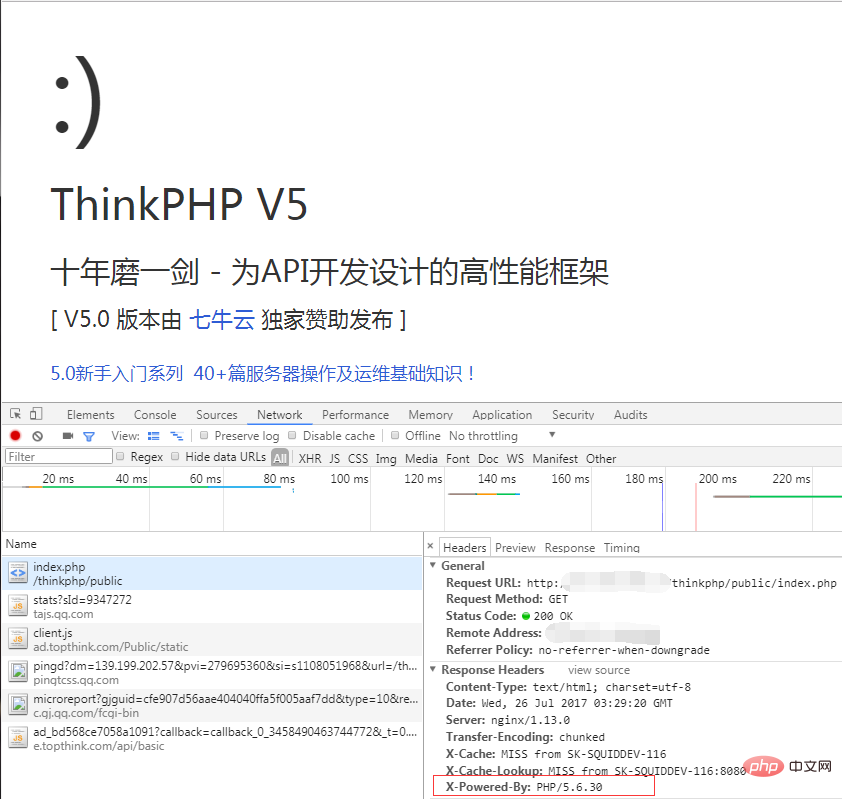
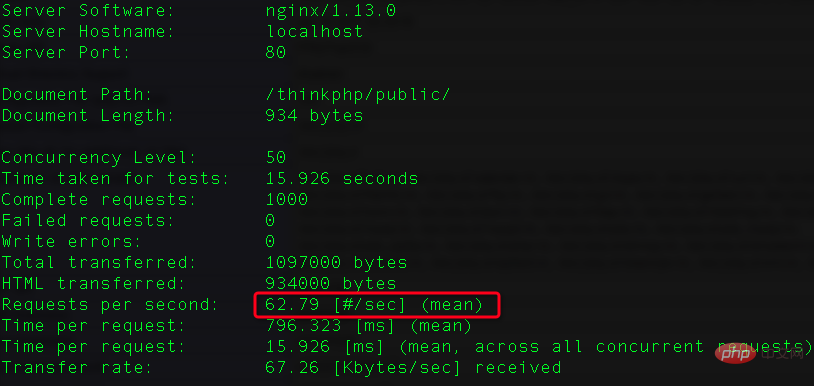
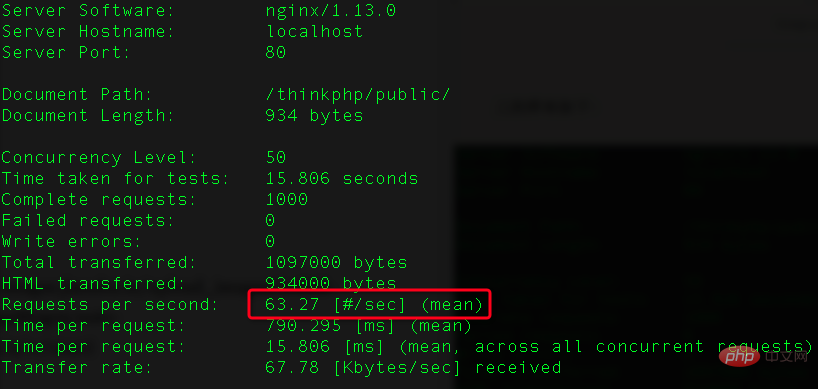
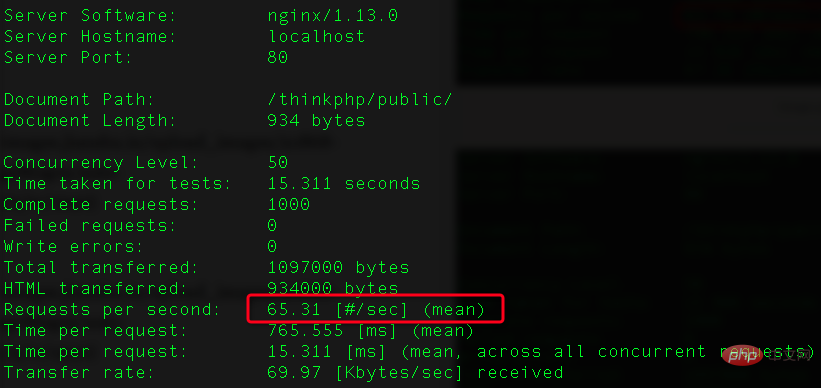
- ##PHP7 version:
-

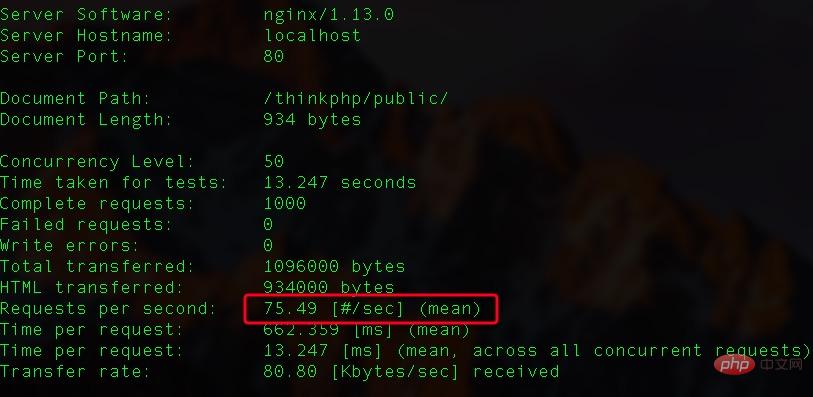

Through the stress test, under the PHP7 version, you can see that the average of the single request time and request completion time, as well as the actual running time of each connection request, are less time-consuming. The most important thing is The performance index QPS is also higher than the PHP5 version.
Opcache performance test of PHP7
Enable opcache:
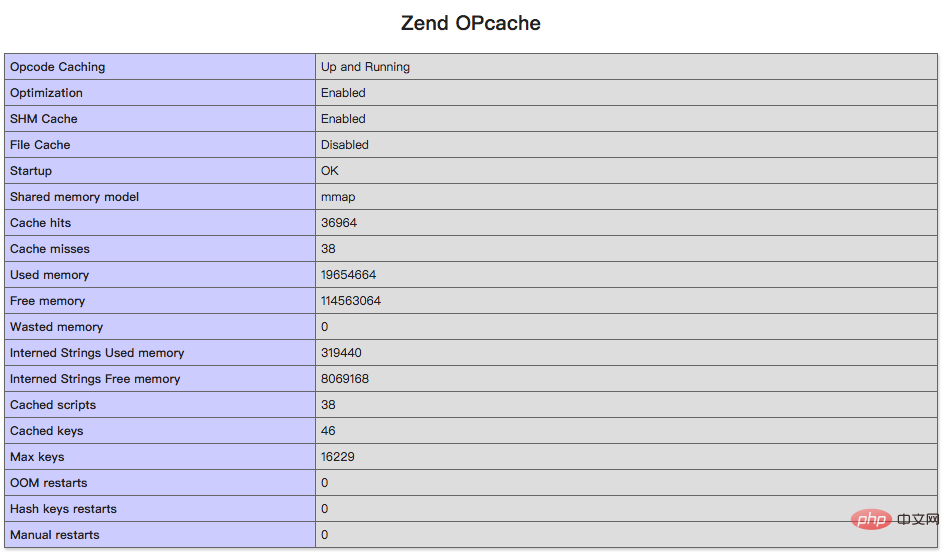
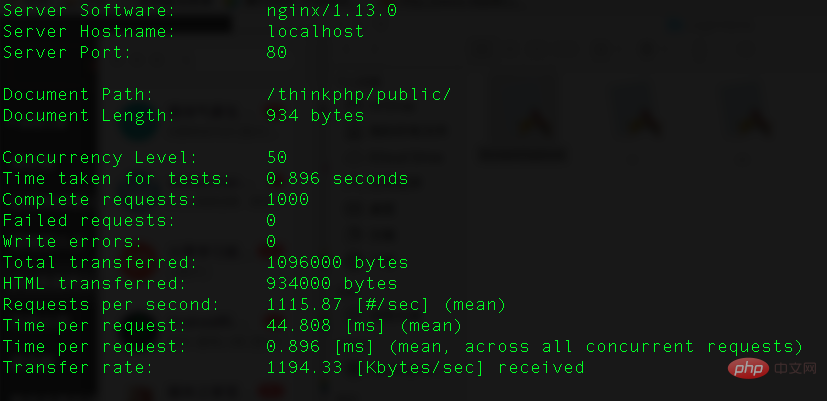
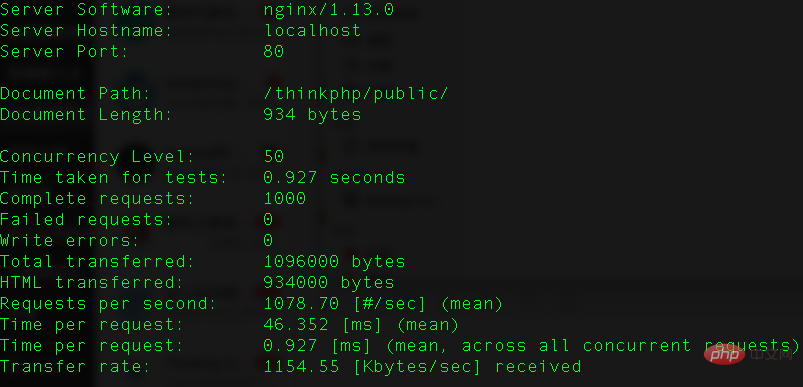
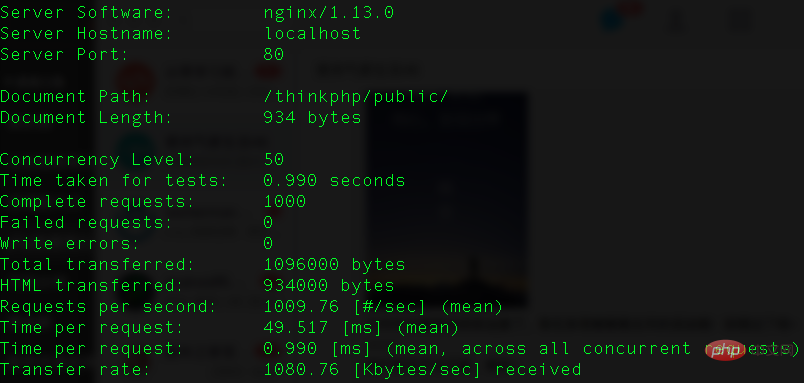
Damn it! PHP7 with opcache turned on is indeed about to take off. Compared with PHP7 that has not been turned on, the performance has improved by more than ten times, and compared with PHP5, it has improved by nearly 20 times! Asking if you are afraid!
PHP script test data is as follows:

PHP7 vs PHP5
Pure PHP script test process, PHP7 performance About 3 to 4 times that of PHP5.
The stress test data is as follows:
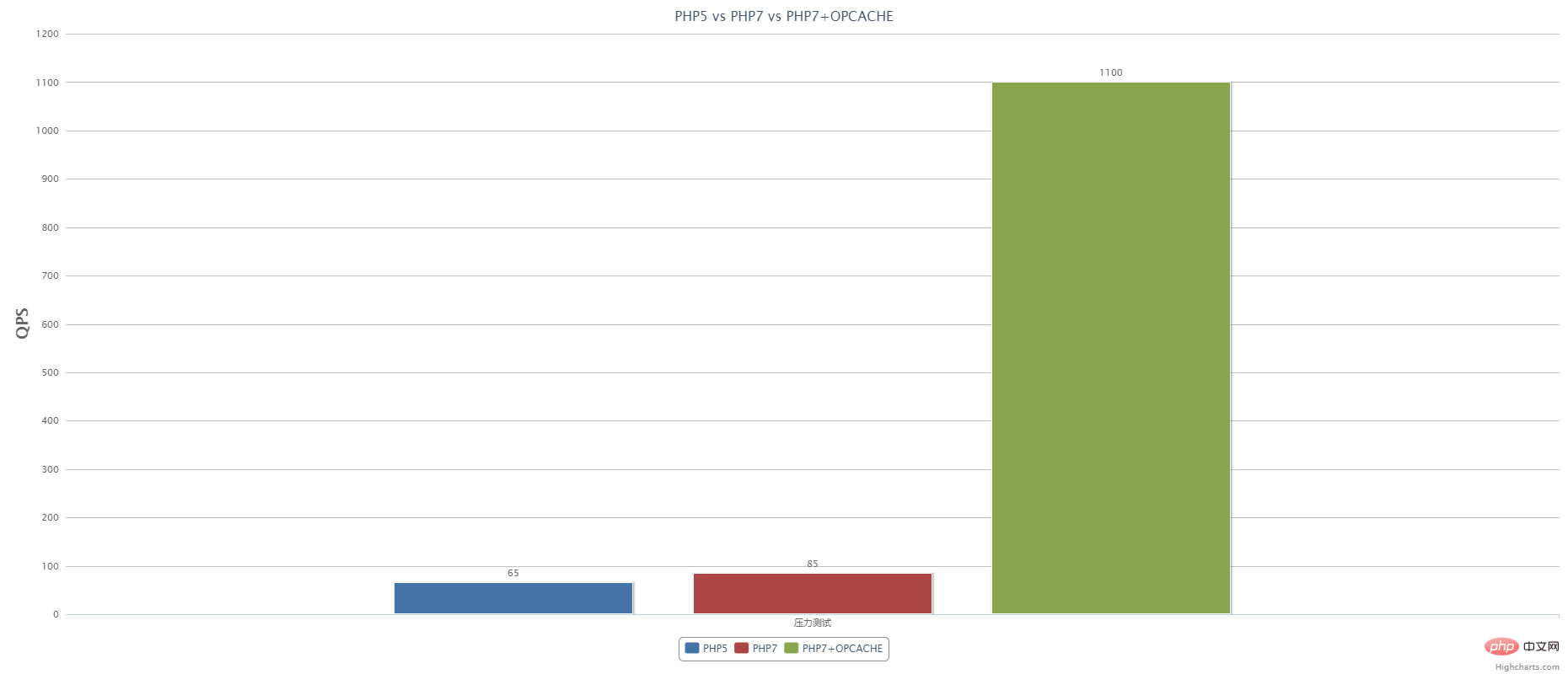
PHP5 vs PHP7 vs PHP7 OPCACHE
Conclusion:
This article makes a simple comparison between PHP7 and PHP5. The performance is indeed improved by 3 to 4 times. Whether in PHP pure scripts or in frameworks, PHP7's high-performance performance is consistent.
PHP7 is fast, PHP7 OpCache is fast, PHP7 is really awesome, a new era of PHP has arrived, use it quickly!
The above is the detailed content of Introducing the comparison between php7 and php5. For more information, please follow other related articles on the PHP Chinese website!

Hot AI Tools

Undresser.AI Undress
AI-powered app for creating realistic nude photos

AI Clothes Remover
Online AI tool for removing clothes from photos.

Undress AI Tool
Undress images for free

Clothoff.io
AI clothes remover

AI Hentai Generator
Generate AI Hentai for free.

Hot Article

Hot Tools

Notepad++7.3.1
Easy-to-use and free code editor

SublimeText3 Chinese version
Chinese version, very easy to use

Zend Studio 13.0.1
Powerful PHP integrated development environment

Dreamweaver CS6
Visual web development tools

SublimeText3 Mac version
God-level code editing software (SublimeText3)

Hot Topics
 What is the difference between php5 and php8
Sep 25, 2023 pm 01:34 PM
What is the difference between php5 and php8
Sep 25, 2023 pm 01:34 PM
The differences between php5 and php8 are in terms of performance, language structure, type system, error handling, asynchronous programming, standard library functions and security. Detailed introduction: 1. Performance improvement. Compared with PHP5, PHP8 has a huge improvement in performance. PHP8 introduces a JIT compiler, which can compile and optimize some high-frequency execution codes, thereby improving the running speed; 2. Improved language structure, PHP8 introduces some new language structures and functions. PHP8 supports named parameters, allowing developers to pass parameter names instead of parameter order, etc.
 How to solve the problem when php7 detects that the tcp port is not working
Mar 22, 2023 am 09:30 AM
How to solve the problem when php7 detects that the tcp port is not working
Mar 22, 2023 am 09:30 AM
In php5, we can use the fsockopen() function to detect the TCP port. This function can be used to open a network connection and perform some network communication. But in php7, the fsockopen() function may encounter some problems, such as being unable to open the port, unable to connect to the server, etc. In order to solve this problem, we can use the socket_create() function and socket_connect() function to detect the TCP port.
 How to install mongo extension in php7.0
Nov 21, 2022 am 10:25 AM
How to install mongo extension in php7.0
Nov 21, 2022 am 10:25 AM
How to install the mongo extension in php7.0: 1. Create the mongodb user group and user; 2. Download the mongodb source code package and place the source code package in the "/usr/local/src/" directory; 3. Enter "src/" directory; 4. Unzip the source code package; 5. Create the mongodb file directory; 6. Copy the files to the "mongodb/" directory; 7. Create the mongodb configuration file and modify the configuration.
 What should I do if the plug-in is installed in php7.0 but it still shows that it is not installed?
Apr 02, 2024 pm 07:39 PM
What should I do if the plug-in is installed in php7.0 but it still shows that it is not installed?
Apr 02, 2024 pm 07:39 PM
To resolve the plugin not showing installed issue in PHP 7.0: Check the plugin configuration and enable the plugin. Restart PHP to apply configuration changes. Check the plugin file permissions to make sure they are correct. Install missing dependencies to ensure the plugin functions properly. If all other steps fail, rebuild PHP. Other possible causes include incompatible plugin versions, loading the wrong version, or PHP configuration issues.
 How to change port 80 in php5
Jul 24, 2023 pm 04:57 PM
How to change port 80 in php5
Jul 24, 2023 pm 04:57 PM
How to change port 80 in php5: 1. Edit the port number in the Apache server configuration file; 2. Edit the PHP configuration file to ensure that PHP works on the new port; 3. Restart the Apache server, and the PHP application will start running on the new port. run on the port.
 How to install and deploy php7.0
Nov 30, 2022 am 09:56 AM
How to install and deploy php7.0
Nov 30, 2022 am 09:56 AM
How to install and deploy php7.0: 1. Go to the PHP official website to download the installation version corresponding to the local system; 2. Extract the downloaded zip file to the specified directory; 3. Open the command line window and go to the "E:\php7" directory Just run the "php -v" command.
 Which one is better, php8 or php7?
Nov 16, 2023 pm 03:09 PM
Which one is better, php8 or php7?
Nov 16, 2023 pm 03:09 PM
Compared with PHP7, PHP8 has some advantages and improvements in terms of performance, new features and syntax improvements, type system, error handling and extensions. However, choosing which version to use depends on your specific needs and project circumstances. Detailed introduction: 1. Performance improvement, PHP8 introduces the Just-in-Time (JIT) compiler, which can improve the execution speed of the code; 2. New features and syntax improvements, PHP8 supports the declaration of named parameters and optional parameters, making functions Calling is more flexible; anonymous classes, type declarations of properties, etc. are introduced.
 PHP Server Environment FAQ Guide: Quickly Solve Common Problems
Apr 09, 2024 pm 01:33 PM
PHP Server Environment FAQ Guide: Quickly Solve Common Problems
Apr 09, 2024 pm 01:33 PM
Common solutions for PHP server environments include ensuring that the correct PHP version is installed and that relevant files have been copied to the module directory. Disable SELinux temporarily or permanently. Check and configure PHP.ini to ensure that necessary extensions have been added and set up correctly. Start or restart the PHP-FPM service. Check the DNS settings for resolution issues.




